The Gut: Humanity's Secondary Brain Explained
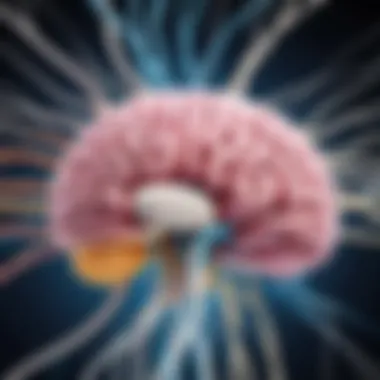
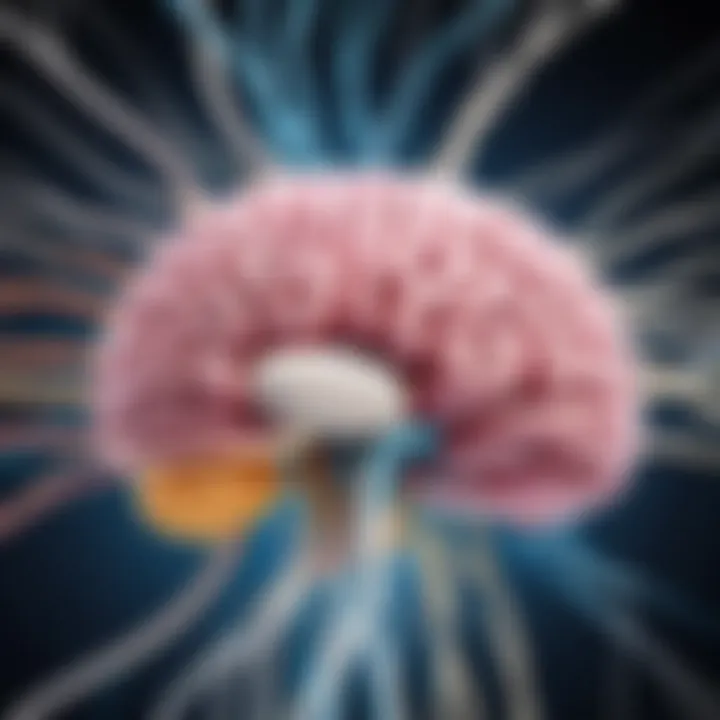
Intro
In recent years, an intriguing perspective has emerged regarding the gut's role in human health. Dubbed the 'second brain,' the gut is not just a digestive powerhouse. It's a complex network of neurons, hormones, and microbes that intricately ties into our overall well-being, influencing not just our physical health but our emotional and mental states as well.
A Different Kind of Intelligence
It's easy to think of the brain as the sole ruler of everything going on in our body. However, it's increasingly clear that the gut plays a pivotal role, acting independently at times. This phenomenon suggests a level of intelligence inherent to our digestive system, managing how we navigate stress, anxiety, and even our day-to-day moods. A balance maintained between the brain and gut can be likened to a well-tuned orchestra, where each part contributes harmoniously or risks producing discord.
"The gut communicates with the brain through a complex highway of neurons, hormones, and signals, creating a dialogue essential to our health."
This article seeks to illuminate how our gut is a vibrant, living entity with its own agency, discussing its anatomical structure, the types of microbes that dwell within, and the profound effects these inhabitants can have on mood, cognition, and overall health.
As we plunge into this exploration, we aim to uncover the overlooked symbiotic relationship between the gut and the brain, which might reveal answers behind both physical ailments and mental health issues with a depth not fully appreciated until now.
The interplay of diet, lifestyle, and gut bacteria stands at the forefront, hinting that what we consume can reverberate far beyond our waistlines. Thus, understanding the many roles of the gut is not merely an academic exercise but a vital inquiry into how we can enhance our health and well-being.
Understanding the Concept of the Second Brain
Understanding the gut as humanity's second brain encompasses an exploration into the complex and often overlooked role that the gastrointestinal system plays in our overall well-being. This notion challenges traditional ideas about the brain being the sole center for controlling our thoughts and emotions. The gut consists of approximately 100 million neurons, creating a robust network that communicates with the central nervous system.
The gastrointestinal tract is not just a passage for food; it acts as an intricate system that influences physical health and mental states. By delving into this concept, we uncover the significant connections between gut health and various aspects of life, from digestion to emotional stability. The relevance of this topic extends beyond biology, inviting a multidisciplinary approach that touches on medicine, psychology, and nutrition.
Understanding the importance of our gut, commonly referred to as the second brain, offers numerous benefits. Here are a few key ones:
- Awareness of Health: Recognizing the gut's impact on health can lead individuals to make informed dietary choices, improving overall well-being.
- Mental Clarity: Knowing how gut health affects neurotransmitter production, like serotonin, can illuminate connections between our diet and mood.
- Holistic Approach: Embracing the interconnectedness of the body’s systems encourages a holistic view of health, steering individuals away from the "one-size-fits-all" mentality often found in conventional medicine.
Overall, acknowledging the gut as a second brain underscores the symbiosis between mind and body, encouraging further inquiry into how our dietary habits, lifestyle choices, and emotional states are intertwined.
Historical Perspectives
Historically, the gut-brain connection wasn't well understood. Ancient cultures recognized the link between digestion and emotions, but modern science has just begun to explore this relationship in depth. The early Greeks, for instance, described the gut as the 'seat of emotions,' while Hippocrates famously noted that "All disease begins in the gut." This ancient wisdom set the stage for contemporary examinations of gut health.
Fast forward to the 20th century, researchers took a more clinical approach, often overlooking the gut's role in the nervous system. It wasn't until the late 1990s that significant advances in neurogastroenterology emerged, revealing how the gut communicates with the brain through various pathways. Researchers began to validate ancient beliefs with scientific evidence, confirming that the gut indeed plays a critical role in emotional and psychological well-being.
The Gut-Brain Connection
The gut-brain connection refers to the way our gut and brain communicate with each other. It's fascinating, really. The enteric nervous system, often dubbed the "second brain," consists of a complex network of neurons embedded in the lining of the gastrointestinal tract. This system operates independently of the brain, allowing it to send signals for digestion while also being influenced by emotional states.
The gut uses several pathways to relay signals to the brain. One of the main routes is via the vagus nerve, which directly links the gut and the central nervous system. This connection allows the gut to send alerts about hunger, fullness, and even emotional distress.
Research shows that this communication isn't one-way. Just like a conversation between old friends, the brain can influence gut behavior. Stress and anxiety can lead to symptoms like bloating or altered bowel habits. Conversely, a healthy gut may help stabilize mood and even enhance cognitive functions.
The intricate relationship between our gut and brain is a testament to how our body operates as a holistic system, where each part communicates and influences the other.
In sum, comprehending the gut's role as a secondary brain invites us to see how interconnected our bodily systems are. This knowledge can empower us to make better decisions about our health and, ultimately, lead to a more fulfilling and balanced life.
Anatomy of the Gut
Understanding the anatomy of the gut is crucial to appreciating its role as humanity's secondary brain. The gut is more than just a processing chamber; it is a neural hub that interacts intricately with the central nervous system. Through its diverse structures and systems, it plays a pivotal role in digestion, mood regulation, and overall health. This part of the article aims to elucidate the significance of the gut's anatomy, shedding light on how its various components contribute to its multifaceted functions.
Structure of the Gastrointestinal Tract
The gastrointestinal tract is a long, winding pathway that extends from the esophagus to the anus, serving essential functions in digestion and absorption of nutrients. Each part of this tract has its own unique characteristics and roles.
Esophagus
The esophagus is a muscular tube connecting the throat to the stomach. Its primary job is to transport food and liquids from the mouth, efficiently navigating the distance to the stomach. One key characteristic of the esophagus is its peristaltic movement, a wave-like contraction that pushes the ingested materials downward. This feature is beneficial as it ensures that the food reaches the stomach smoothly without backflow.
However, issues can arise here, such as gastroesophageal reflux, where stomach acids flow back up into the esophagus. This can lead to discomfort and can interfere with the entire digestive process. The esophagus's role in overall gut health cannot be understated, as any dysfunction here can significantly impact the body's nutrient intake and subsequent energy levels.
Stomach
The stomach serves as a crucial mixing and holding area for food. It's where the mechanical and chemical digestion begins in earnest, breaking down food with its acidic environment and gastric juices. One prominent aspect of the stomach is its capacity to expand, allowing it to store food and regulate the release of digested materials into the intestines.
A unique feature of the stomach is the production of intrinsic factor, a protein essential for the absorption of vitamin B12. This aspect is particularly important for preventing deficiencies that can affect neurological functions. However, excessive acid production or bacterial infections such as H. pylori can compromise stomach health, potentially leading to ulcers or other issues that can ripple through the entire digestive system.
Intestines
The intestines, encompassing both the small and large intestines, are where the magic of absorption and fermentation happens. The small intestine is a uniquely designed structure with inner folds and villi, maximizing the surface area to absorb nutrients efficiently. This aspect is vital for energy production and overall bodily function.
On the flip side, the large intestine plays a significant role in water absorption and the formation of stool. One interesting characteristic here is the vast entry of gut flora that helps in breaking down undigested food, giving the intestines a key role in ensuring a healthy microbiome.
An advantage of this intricate structure is its adaptability; however, when something goes awry, such as the occurrence of inflammatory bowel disease, it can dramatically affect gut health and, consequently, mental well-being.
Enteric Nervous System Anatomy
The enteric nervous system (ENS) is often sketched as the "second brain" located in the gut. It operates independently yet communicates closely with the central nervous system. Comprehending its anatomy unveils how the gut can influence our mental state.
Neurons in the Gut
The gut houses millions of neurons that form the enteric nervous system. These neurons are responsible for controlling gut motility, enzyme secretion, and blood flow to the digestive organs. A key characteristic of these neurons is their ability to reflexively react without needing input from the brain. This arrangement allows the gut to self-regulate many of its functions.
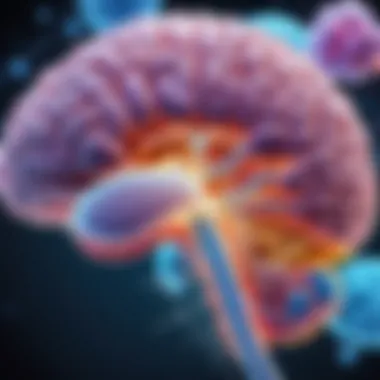
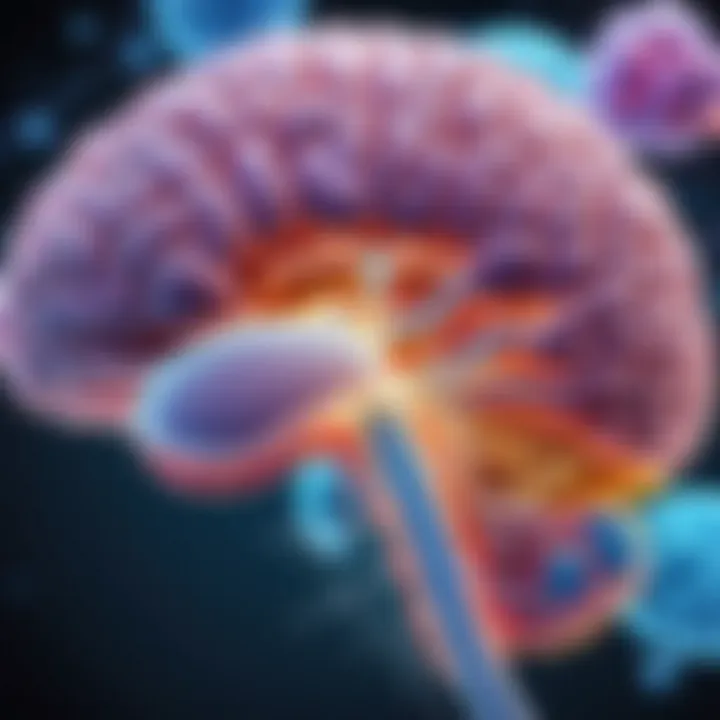
The abundance of neuron types, including sensory neurons that monitor the gut's environment, is crucial. However, disturbances in these neurons can lead to issues like irritable bowel syndrome, showcasing the importance of maintaining a balanced gut ecosystem.
Ganglia Role
Ganglia in the gut serve as relay stations for nerve signals, playing a crucial role in coordinating gut movements and function. They house clusters of neurons that process information and facilitate communication between different digestive regions. A significant advantage of these ganglia is their influence on how quickly food moves through the gut, impacting digestion efficiency.
Nonetheless, when dysfunction occurs, it may cause motility disorders, leading to severe gastrointestinal issues. The health of the ganglia can thus serve as an indicator of overall gut and brain health, underscoring their importance in our understanding of gut-related conditions.
Understanding the anatomy of the gut provides insights into its profound influence on human health, making it essential for acknowledging the gut as a "second brain."
Through this detailed exploration of the gut's anatomy, it becomes evident that each component, from the esophagus to the intricate nervous system structures, plays a pivotal role in its functions. This understanding sets the stage for a deeper investigation into the physiological functions that occur within this remarkable system.
Physiological Functions of the Gut
The physiological functions of the gut are central to understanding its designation as a secondary brain. This organ does more than digest food; it interfaces intricately with the nervous system and plays a significant role in maintaining homeostasis. The gut is a cornerstone of our health, influencing not just digestion but also hormonal balance and immunity. Here, we’ll dive deeper into how these functions are interlinked, providing a clearer picture of their importance.
Digestion and Absorption
Digestion begins the moment food touches the tongue, but the heavy lifting is done in the gut. The intricate process of breaking down food into nutrients relies on a harmonious blend of enzymes, acids, and gut flora. Each of these elements plays a unique role:
- Enzymatic Action: As food travels down the esophagus, it meets enzymes secreted by the salivary glands, stomach, and pancreas. These enzymes dismantle complex food structures into simpler molecules that the body can absorb efficiently.
- Gut Flora Contribution: Our microbiome, primarily composed of bacteria, assists in fermentation and breakdown of otherwise indigestible substances. They produce short-chain fatty acids, essential for gut health and providing energy to colon cells.
The end result? A well-functioning gut absorbs vital nutrients such as vitamins, minerals, and amino acids, directly impacting our energy levels, cognitive function, and overall well-being.
Hormonal Regulation
The gut isn't just a passive player in digestion; it actively participates in hormone production and regulation. Hormones produced in the gut can dictate numerous bodily functions, including hunger and mood. For instance:
- Ghrelin: Known as the hunger hormone, it gets released when the stomach is empty, driving the urge to eat.
- Leptin: On the other side, when you’ve had your fill, leptin sends signals to the brain to stop eating. These hormones communicate even more than just food status—they impact feelings of satisfaction and well-being.
The interplay between gut hormones and brain health offers a compelling insight into how we experience hunger and satiety. Disruptions in this system can lead to conditions like metabolic syndrome or obesity, suggesting that understanding gut hormones is crucial for holistic health management.
Immune System Interaction
Surprisingly, about 70-80% of the immune system resides in the gut. This intimate relationship reveals the gut's role as not just a digestive organ but also a critical defense mechanism. Here are some key factors highlighting this interaction:
- Barrier Function: The gut acts as a barrier against pathogens. Tight junctions between intestinal cells help prevent harmful substances from entering the bloodstream, thus lowering risk for infections.
- Gut-Associated Lymphoid Tissue (GALT): This tissue is integral to immune responses. It detects antigens and activates immune cells, providing immediate defense against potential threats.
"The gut acts as a gatekeeper, ensuring that while it absorbs the good, it thwarts the bad."
Understanding the immune system's link to gut health invites serious consideration for conditions like autoimmune diseases, where this balance might be disrupted. The gut's physiological functions thus are not to be taken lightly; they sway myriad aspects of our health, shaping experiences from food intake to emotional stability.
Microbiome Influence
The human gut hosts trillions of microorganisms, collectively referred to as the gut microbiome. This complex ecosystem plays a crucial role, often dubbed the second genome for its influence on our health and well-being.
A well-balanced microbiome contributes to vital bodily functions, affecting everything from metabolism to immunity. The interplay between these microorganisms and our physiology is profound, illustrating why it’s essential to understand their impact on our everyday lives. An imbalance in gut flora can lead to various health problems, indicating how deeply these microscopic entities intertwine with our physical and mental states.
Importance of Gut Flora
Gut flora, or gut microbiota, encompasses diverse bacteria, viruses, fungi, and other microorganisms. Their significant role in digestion is perhaps the most discussed aspect. However, they also produce vitamins, break down nutrients, and guard against pathogens. The state of your gut flora can influence your health in various ways:
- Digestion: Efficient transformation of food into energy.
- Immune Response: Strengthening defenses against infections.
- Mental Health: Impacting hormones that affect mood.
Promoting a healthy gut flora is essential for maintaining overall health. Factors like diet, lifestyle, and even genetics play pivotal roles in shaping the microbiome’s composition.
Microbiome Diversity and Health
Diversity within the microbiome is paramount for robust health. Different strains of bacteria contribute uniquely to various functions, creating a complex symphony that promotes balance in the gut. Two significant factions of gut bacteria are Bacteroidetes and Firmicutes, each with distinct capabilities and characteristics.
Bacteroidetes
Bacteroidetes are a major component of the gut microbiome, known for their ability to help digest complex carbohydrates. These bacteria specialize in breaking down fibers from plants, turning them into short-chain fatty acids that are vital for gut health.
- Key Characteristic: Their proficiency in fiber fermentation sets them apart from other gut bacteria.
- Benefit: They support weight management by influencing energy extraction from food. A higher ratio of Bacteroidetes is often associated with leaner body compositions.
A unique feature of Bacteroidetes is their adaptability to varying diets. They thrive not just on fiber, but also on polysaccharides and other macromolecules. Thus, incorporating diverse plant-based foods can boost their population in the gut, leading to improved overall health. However, an excessive presence of Firmicutes over Bacteroidetes is often linked with obesity, crying out for balance.
Firmicutes
Firmicutes, another major group of bacteria, are known for their role in fermenting sugars and fats. They possess a unique ability to extract energy from food better than many other types. This characteristic can make them advantageous in certain situations.
- Key Characteristic: They are versatile and can thrive in low-oxygen environments, a common condition in the gut.
- Benefit: They play a critical part in the digestion of fats, contributing to energy storage and metabolic processes.
Nevertheless, this prowess has a flip side. When Firmicutes outnumber Bacteroidetes, it may lead to excess energy extraction, potentially resulting in weight gain. Maintaining a proper balance between these two groups is vital for promoting metabolic health. It’s a dance of balance, with both factions playing crucial - yet sometimes opposing - roles in maintaining gut health
"To optimize gut health, we must ensure a diverse microbiome that embraces both Bacteroidetes and Firmicutes."
Understanding these microorganisms and their specific roles can empower us to make informed lifestyle choices that enhance our gut health. This insight reinforces the critical interconnection between diet, flora balance, and overall health, urging us to nourish our second brain.
Gut and Mental Health
The connection between gut health and mental well-being has gained considerable traction in recent years. Many studies highlight the gut as a pivotal player when it comes to mood regulation and cognitive function. The gut does not just process our food; it’s a dynamic system that communicates with our brain, influencing feelings such as happiness and anxiety. This section delves into how our gut's health directly affects our mental state, presenting a compelling narrative about the importance of nurturing this connection to enhance overall well-being.
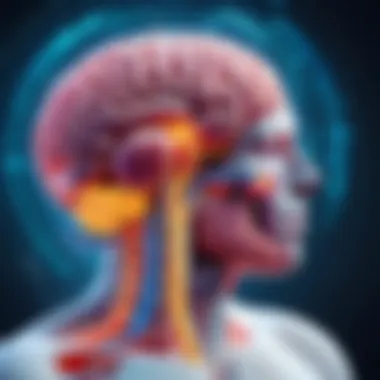
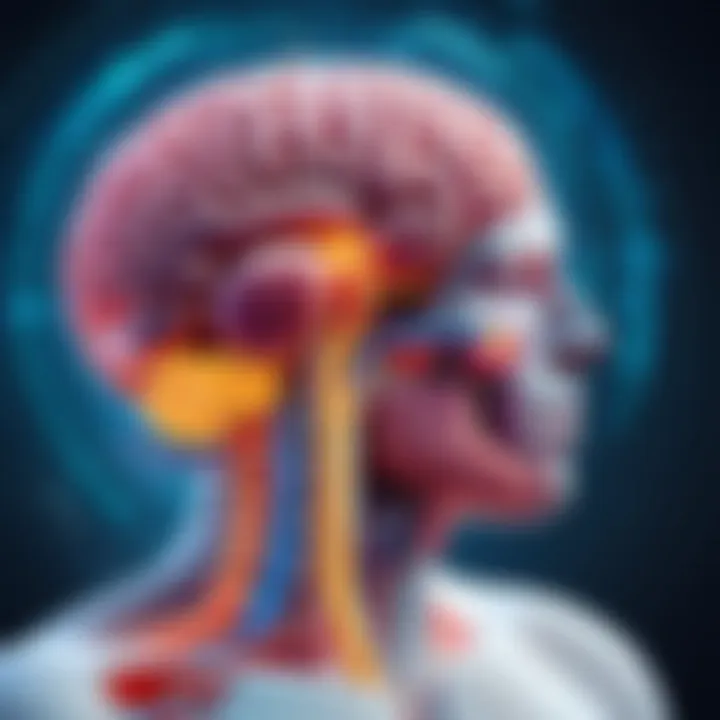
Gut's Role in Mood Regulation
The gut produces a myriad of chemicals that can affect mood. Among these is an interesting interaction with stress levels and how it modulates them. When the gut flora is in a state of harmony, it can lead to increased resilience against stress. This balance can foster emotional stability, which is often bounced around like a ping-pong ball in the lives of many. Notably, poor gut health is often linked to higher levels of stress and anxiety. So, keeping the gut in good shape might just make you feel like you can take the world head-on.
Influence on Neurotransmitters
The gut's influence extends to neurotransmitters, which are crucial in brain signaling and mood control. This area of study reveals a red thread connecting gastrointestinal health and mental health, showcasing just how intertwined they really are.
Serotonin Production
Serotonin, often labeled the "feel-good hormone," plays a vital role in mood regulation. Interestingly, about 90% of the body's serotonin is produced in the gut. This fact amplifies the relevance of gut health in the discussion surrounding mood disorders. A healthy gut ensures a smooth production line of serotonin, impacting not only psychological well-being but also things like sleep and appetite. This makes it a critical component when considering treatments for mood disorders. Picture this: if your gut is happy, your serotonin levels are likely following suit, providing a natural buffer against anxiety.
- Key characteristic of serotonin production: Gut microbiota play a crucial role in synthesizing serotonin.
- Unique feature: It's not just brain chemistry at play, the gut itself is a significant contributor.
- Advantages: A balanced gut flora can lead to improved mental health outcomes.
GABA Levels
GABA, or gamma-aminobutyric acid, is another neurotransmitter that deserves a spotlight. It's primarily inhibitory, meaning it helps calm the nervous system. The relationship between gut health and GABA production can have massive implications for managing anxiety and promoting calmness. When the gut is in good health, it can help maintain optimum GABA levels.
- Key characteristic of GABA levels: Inhibitory action, helping regulate anxiety and stress responses in the body.
- Unique feature: It serves as an anti-anxiety agent, acting as a natural tranquilizer.
- Advantages: A healthy gut can bolster GABA levels, which promotes better sleep and reduces anxiety.
"A healthy gut is like a well-tuned engine, ensuring smooth operations, both physically and mentally."
In summary, the intricate relationship between the gut and mental health cannot be overstated. From mood regulation to neurotransmitter production, maintaining gut health is essential for fostering not only physical but also mental stability. With growing understanding comes the potential for innovative approaches to treating mental health through diet and lifestyle adjustments focused on gut health.
Effects of Diet on Gut Health
Diet significantly shapes not just our waistlines but also the intricate ecosystem residing within our guts. It's astonishing to consider how what we put on our plates directly influences the balance of bacteria and, in turn, our overall health. A balanced gut plays a crucial role in breaking down food and synthesizing essential nutrients, which is foundational to our well-being. This section explores specific elements about the effects of diet on gut health, particularly focusing on probiotics, prebiotics, and the consequences of consuming processed foods.
Probiotics and Prebiotics
When we mention probiotics, we're typically referring to those live microorganisms that confer a health benefit on the host, in simple terms, our gut. Think of them as friends that assist in the breakdown of food and prevent the unwelcome party crashers - this is especially relevant when discussing gut health. Common sources include yogurt, kefir, and sauerkraut.
Prebiotics, on the other hand, serve as food for these probiotics. They are non-digestible fibers that foster the growth of beneficial bacteria in the gut. Foods rich in prebiotics include garlic, onions, and bananas. Essentially, having a hearty combination of both probiotics and prebiotics in your diet can create a flourishing gut environment.
- Benefits of Probiotics:
- Benefits of Prebiotics:
- Digestive Health: Probiotics can assist with issues such as bloating and diarrhea.
- Immune Support: A healthy gut can bolster the immune system, making you less susceptible to illness.
- Improved Mineral Absorption: They aid in the absorption of essential minerals like calcium and magnesium.
- Enhanced Gut Barrier: Prebiotics can strengthen the gut lining, which keeps harmful substances from leaking into the bloodstream.
"The gut microbiome is a living organ, constantly interacting with food, lifestyle, and even emotions."
Impact of Processed Foods
The reality is that in our fast-paced world, processed foods have become all too common. These foods often come with strings attached – high levels of sugar, unhealthy fats, and artificial additives. Such components can wreak havoc on our gut microbiota. Unlike whole foods, processed options offer little to no fiber, which can lead to imbalance among bacterial populations.
Moreover, they have been linked to a myriad of health issues, including inflammatory bowel diseases and metabolic disorders. The connection between the gut and the brain also suggests that consuming a diet high in processed foods might contribute to mental health woes, like anxiety and depression.
To minimize the adverse effects on gut health, consider the following tips:
- Limit processed food intake: Instead, opt for whole, nutrient-dense foods.
- Focus on fiber-rich foods: Aim to fill your plate with fruits, vegetables, and whole grains.
- Stay hydrated: Water is essential for digestion and helps maintain mucosal lining in the intestines.
Ultimately, the choices you make when it comes to food can significantly impact your gut health, which in turn affects your overall health and mood. Understanding this relationship is key, especially for those keen on optimizing their health through diet.
Medical Implications
The understanding of gut health has transformed the landscape of medicine and health science. It's no longer just about what happens in the digestive organs, it’s about how the gut affects our entire bodily functions and even mental well-being. The implications of what's happening in our gut can ripple through to many aspects of our health, and this is especially relevant in today's world where chronic diseases are rampant and the quest for optimal health is more critical than ever.
This section will zero in on two distinct yet interrelated areas: Gut Disorders and Correlation with Mental Disorders. By dissecting these areas, we can appreciate how the gut's health—or lack thereof—plays a pivotal role in overall wellness and functioning.
Gut Disorders
IBS
Irritable Bowel Syndrome (IBS) is a condition that affects the large intestine and is characterized by symptoms like abdominal pain, bloating, gas, and changes in bowel habits. It's a prime example of how disturbances in gut function can lead to significant discomfort and disruption in daily life. IBS is often labeled a functional disorder, meaning it results from issues with how the gut works rather than structural abnormalities. This can be a double-edged sword — while it highlights how sensitive our gut can be, it also complicates diagnosis and treatment, leaning heavily on patient-reported outcomes.
The relevance of IBS to the topic of gut as the secondary brain lies in its relationship with stress and mental health. Many people with IBS report that stress exacerbates their symptoms. Thus, it becomes crucial to consider psychological factors when treating this condition.
Unique Feature: A particularly interesting aspect of IBS is its association with diet. Different food triggers exist for different individuals, making personal dietary adjustments essential.
- Advantages: Understanding IBS can lead to a tailored approach to dietary management, potentially alleviating symptoms and improving quality of life.
- Disadvantages: The condition is often dismissed as merely a nuisance, unintentionally undermining the serious impact it can have on a person’s life.
Crohn's Disease
Crohn's Disease is part of a family of autoimmune diseases that cause inflammation of the digestive tract. It can impact any part from the mouth to the anus, but is mostly found in the intestines. The chronic nature of this disease and episodes of flare-ups can severely affect not just digestion but overall quality of life. A distinguishing characteristic of Crohn's is that it can affect healthy sections of the intestine mixed in with inflamed areas, unlike Ulcerative Colitis which only affects the inner lining of the large intestine.
The involvement of the gut in Crohn's is compelling for discussions about the second brain because stress and emotional states can influence the course of the disease significantly. Stress management and effective therapeutic strategies are therefore vital in dealing with the physical and emotional challenges of Crohn's.
Unique Feature: Unlike IBS, Crohn's can cause structural damage to the intestines, leading to more severe complications.
- Advantages: Recognizing the role of emotional health in Crohn's management opens avenues for integrative approaches, combining traditional and cognitive-behavioral treatments.
- Disadvantages: The chronic nature of Crohn's requires continuous medical supervision, which can be draining for patients, both financially and emotionally.
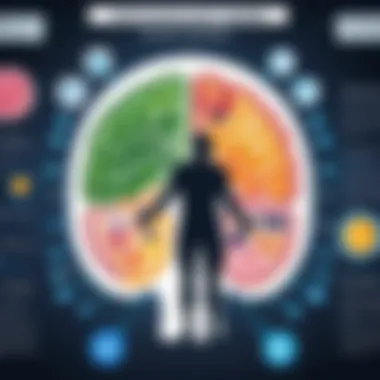
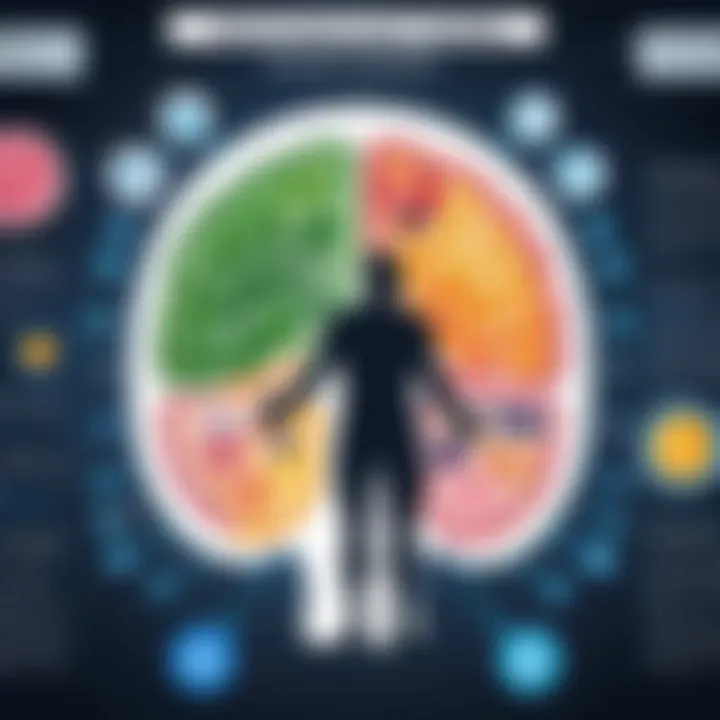
Correlation with Mental Disorders
The ties between gut health and mental disorders create a rich area for exploration. Gut health isn’t just about digestion; it closely relates to how we feel emotionally. Scientific inquiry into the gut-brain axis suggests that mental conditions such as anxiety and depression may be complicit in or even exacerbated by gut health issues.
Anxiety
Anxiety disorders are pervasive in today’s society, affecting millions worldwide. Some studies propose that gut health—specifically, the composition of gut microbiota—may significantly affect anxiety levels. It’s argued that a disrupted microbiome can lead to neuroinflammation, which may trigger or worsen anxiety disorders.
This interplay signifies that addressing gut health could potentially provide new avenues for tackling anxiety. It emphasizes the need for a holistic view of treatment that takes both gut and mental health into account.
Unique Feature: Probiotics have been studied as a supposed remedial option for anxiety, suggesting a real connection between gut flora and emotional stability.
- Advantages: Improving gut health through diet or supplements could offer a complementary strategy for managing anxiety.
- Disadvantages: Placing too much emphasis on gut health might lead to overlooking other critical factors that contribute to anxiety.
Depression
Research shows troubling links between gut health and depression. Much like anxiety, there's evidence indicating that a poor microbiome could disrupt serotonin production, a neurotransmitter crucial for mood regulation. The gut microbiome acts not just as a passive player but rather as an active participant influencing emotional states and mood through biochemical pathways.
Unique Feature: Treatment approaches, such as the use of antidepressants, are increasingly paired with dietary interventions focusing on gut health, pushing the envelope on traditional treatment paradigms.
- Advantages: Understanding the connection between gut and mental health can lead to more comprehensive treatment options that support both physical and mental well-being.
- Disadvantages: If treatment relies solely on gut health without considering other contributing factors, it risks providing an incomplete solution to those struggling with depression.
"The intricate relationship between the gut and the brain serves as a reminder that our mental and physical health are deeply intertwined."
Research Perspectives
The exploration of the gut as humanity's secondary brain invites a plethora of research angles that reveal invaluable insights into human health, well-being, and behavioral patterns. Understanding the research perspectives surrounding gut health is essential as it showcases the intricate relationship between the gastrointestinal system and the central nervous system. This understanding can lead to innovative treatments and preventive strategies for an array of health issues.
Current Studies on Gut Health
Current studies in gut health often focus on how the microbiome influences various bodily functions. Research indicates that the gut microbiota is not just for digestion but plays pivotal roles in metabolic processes and immune responses. Some noteworthy areas of consideration include:
- Microbiome Diversity: Studies highlight that a diverse gut flora can significantly enhance an individual's health. A varied diet rich in fruits, vegetables, and fermented foods promotes this diversity, ultimately leading to improved gut function and overall well-being.
- Link to Mental Health: There's a growing body of evidence that connects gut health with mental health disorders such as anxiety and depression. Recent investigations suggest that a balance in gut microbiota can affect the levels of neurotransmitters, thereby influencing mood and cognitive functions.
- Inflammatory Bowel Disease (IBD): Research continues into the relationship between gut health and chronic conditions like Crohn's disease and ulcerative colitis. Understanding the triggers and underlying mechanisms of these illnesses can lead to more targeted and effective treatments.
"What we eat not only affects our body but may also shape our mind and emotions through the gut-brain axis."
Future Directions
Research into gut health is an ever-evolving field, and it is not just a hot topic; it is a critical frontier in medical science. Future directions look promising and could unveil even more connections between our lifestyles and gut functionality. Some key areas of future research include:
- Technological Innovations: With advances in technology, scientists are using DNA sequencing and computational biology to better understand the gut microbiome's composition and its effects on health. These tools will provide comprehensive maps of gut bacteria and their functions, ultimately guiding personalized dietary recommendations.
- Clinical Trials: More randomized controlled trials are necessary to ascertain the effects of specific probiotics and dietary interventions on both gut and mental health. Investigating how interventions can restore balance in the microbiome could pave the way for novel therapeutic approaches.
- Broader Impacts on Health Policy: As knowledge expands, there’s potential for significant policy implications. Developing public health initiatives that emphasize gut health awareness could lead to healthier populations and reduced healthcare costs.
Addressing the research perspectives surrounding the gut as the second brain lays the groundwork for an in-depth understanding of the interactions between our gut and overall health, leading us closer to deciding how best to nurture this vital organ.
Practical Applications of Gut Health Knowledge
Understanding the gut's intricate workings does far more than satisfy sheer curiosity; it has tangible, real-world implications for wellness and vibrant living. The knowledge of how our second brain operates empowers individuals to make informed lifestyle choices that can enhance health and well-being. This section unveils the benefits of not only recognizing the gut's influence but also applying that knowledge into everyday life.
One of the cornerstone aspects of optimizing gut health lies in dietary adjustments. Making straightforward changes to what we eat can dramatically influence gut microbiota, which in turn regulates various physiological functions. For instance, incorporating high-fiber foods such as leafy greens, legumes, and whole grains can promote the growth of beneficial bacteria. These foods act as a feast for our microbiome, leading to improved digestion and possibly even a positive shift in mood and cognition.
It’s not just what we eat, but how we eat that counts. Mindful eating practices—savoring every bite, steering clear of distractions, and listening to hunger cues—can positively impact gut health. These adjustments not only make meals pleasurable but can aid in reducing stress that spills over into the gut, contributing to various gut-related issues.
Dietary Adjustments
When it comes to harnessing gut health knowledge, dietary changes are paramount. Here are some key considerations for effective dietary adjustments:
- Incorporate Probiotics: Foods that are naturally fermented, like yogurt, kefir, and sauerkraut, can help introduce good bacteria into the gut. These probiotics can support the gut-barrier function, enhancing digestive health and overall immunity.
- Focus on Prebiotic Foods: Foods rich in prebiotics—like bananas, onions, and garlic—serve as fuel for probiotics. They nourish beneficial gut bacteria, helping them thrive.
- Hydration Matters: Drinking plenty of water is essential for digestion and nutrient absorption. Keeping hydrated supports mucosal lining and helps flush out toxins.
- Limit Processed Foods: Processed foods, high in sugars and unhealthy fats, can disrupt the normal gut flora balance. Cutting these from your diet can substantially improve gut health.
Adopting these strategies may seem simple on the surface, but their impact can be profound.
Gut Health Supplements
Supplements play a significant role in enhancing gut health, especially when dietary adjustments alone do not yield desired outcomes. Here are some aspects to consider when venturing into the world of gut health supplements:
- Probiotic Supplements: Available in various strains, these can boost gut microbiota diversity. Different strains cater to different health needs, so it’s key to choose one aligned with your health goals.
- Digestive Enzymes: These supplements help break down food more effectively, improving nutrient absorption and easing digestive discomfort.
- Fiber Supplements: For those who struggle to consume enough dietary fiber, supplements can help ensure the gut receives adequate support. Products like psyllium husk can be an easy way to add fiber to your diet.
- Collagen: This protein not only supports skin health but may also promote gut lining integrity, reducing symptoms of conditions like leaky gut syndrome.
"The gut is more than just a digestive system; it is a critical player in our mental and physical health. Transformative changes can start with informed dietary choices and thoughtful supplementation."
By embracing practical applications of this knowledge, individuals can unlock a new level of health consciousness, formed by the very pathways of their second brain.
Ending
The exploration of the gut as humanity's secondary brain presents a wealth of insights that transcend conventional understanding of human physiology. Emphasizing the intricate and profound connections between our gastrointestinal health and overall well-being sheds light on various health domains and lifestyle choices. The implications are not just theoretical; they span practical, everyday adjustments that anyone can make to enhance their quality of life.
Summary of Key Points
- Gut-Brain Communication: The gut operates through a complex two-way communication system with the brain, utilizing the vagus nerve and neurotransmitters. This connection is pivotal in influencing emotions, mood, and cognition.
- Role of Microbiome: The diverse ecosystem of bacteria within us plays significant roles in mental health, nutrient absorption, and even immune function. It is vital to understand how what we consume shapes our gut flora.
- Diet's Impact: Dietary choices directly affect gut health. An emphasis on whole, unprocessed foods, along with probiotics and prebiotics, can foster a healthier gut environment.
- Health Conditions: Emerging research highlights correlations between gut health and conditions such as anxiety, depression, and autoimmune disorders. This understanding prompts consideration of holistic approaches to treatment.
The Path Forward in Understanding the Gut
The future of gut health research appears promising. As technology advances, particularly in genomics and microbiome analysis, we gain deeper insights into the specific roles of gut flora tailored to individual health contexts. This personalized approach holds the potential to revolutionize how we view nutrition and medicine.
Practically speaking, educating on gut health can empower individuals to make informed dietary choices. Benefits include not just improved physical health but also enhanced mental clarity and emotional stability. Efforts are underway to integrate this knowledge into mainstream medicine, advocating for a more holistic approach that regards the gut not as a mere digestive organ but as a critical player in our overall mental and physical health.
In summary, a cutting-edge focus on the gut as a secondary brain reinforces the interconnected nature of bodily systems, urging both scientific communities and the public to pay attention to this extraordinary aspect of human biology. Understanding our gut is, in essence, understanding ourselves.
"The gut is a doorway to understanding human health, bridging biology, psychology, and nutrition into a cohesive narrative crucial for future wellness."
As we advance in deciphering the complexities of the gut and its vast influence, we unveil not only pathways to better health but also a more coherent narrative about what it means to be human.







